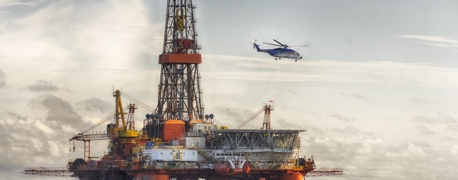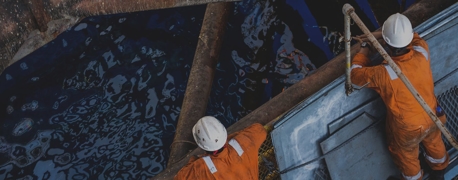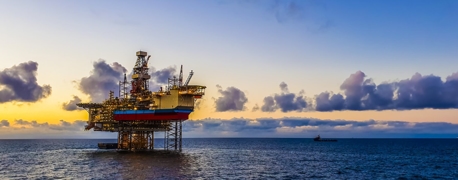8 Things You Need to Know If You’ve Been Injured Offshore

If you work offshore, it’s likely that you know your job is among the most risk-filled in the world. Rough conditions, dangerous equipment, and toxic materials are just a few of the dangers maritime workers face. While employers are supposed to protect workers from these dangers, many cut corners to save money. They gamble that an accident won’t happen. When one does, they assume they can hide behind their legal teams to escape accountability. They hope that workers don’t find the help they need to get the justice they deserve.
If you’ve been injured offshore, you deserve that justice. At Arnold & Itkin, it's our job to make sure that you get it. To help, we've compiled a list of the eight things you need to know if you've been hurt.
1) Should I Trust My Company to Do the Right Thing?
Often, maritime workers sustain injuries after years—or even decades—of service to a company. Because of this, it isn’t unreasonable that they assume their company will do the right thing for them.
While this is the way things should be, it isn’t always how they are.
As offshore accident lawyers, we often see companies do the opposite of “the right thing.” After an accident, they start damage control. Employers try to minimize workers’ injuries, pressure survivors to sign releases, and deny that something could have been done to prevent what happened. In some cases, they even use a 100-year-old law to sue survivors and grieving families and limit their losses.
If you’ve been injured while working offshore, you need to speak with an offshore injury attorney to understand your rights. You need to look out for your best interests. You can be sure your company is consulting with an attorney to look out for theirs.
2) What Is Maritime Law?
Maritime law, also known as admiralty law, is one of the oldest sets of legal codes in the world. When you've been injured offshore, you should know that your case will heavily involve it and then find a lawyer who can help (see #7). American maritime law is mostly federal and traces its roots back to the nation’s time as a British colony. It generally governs activities on the water—most of which involves offshore work. Maritime law has rules for everything from vessel maintenance to the job duties of offshore workers and what happens when they get hurt.
The most unique aspect of maritime law is how independent it is. While all workers on land are governed by the same general law, maritime law exclusively applies to offshore workers and those who work in support of offshore industries. Because of this, laws like the Jones Act, Longshore and Harbor Workers’ Compensation Act (LHWCA), and Death on the High Seas Act exclusively apply to the maritime industry.
3) How Long Do I Have to Get an Offshore Injury Lawyer?
Typically, those who are using the Jones Act or other maritime laws have three years from the time of their accident to file a claim. However, this timeframe can vary depending on several factors, so it’s important to call a maritime law firm—even if you’re uncertain if too much time has passed since your accident.
Despite having as much as three years to file a maritime injury claim, injured workers should delay getting legal assistance as little as possible. Quickly contacting a lawyer means giving your legal team as much time as possible to accomplish an investigation, gather evidence, and build a strong case on your behalf.
A maritime lawyer will immediately start working to help you:
- Protect your interests
- Reach a fair settlement
- Get the right medical care
- Investigate your accident
- Counter any false claims made by the other side
- Take a claim to court if needed
It’s important to note that some offshore claims require employees to receive notification of an accident within 30 days. For example, workers using the LHWCA have a year to file a claim, but only if they notified their employer of their accident within 30 days of it happening.
Making sure you’re doing everything correctly is fast, free, and confidential when you call our maritime injury law firm.
4) How Has Maritime Law Changed for Offshore Workers?
In the past, workers had trouble receiving compensation for their injuries. While the maritime industry had a centuries-old concept known as maintenance and cure, this law only accounted for the compensation a worker needed until they reached maximum recovery. In other words, if a person was seriously injured to the point where they could no longer work, their employer only had to compensate them until they recovered as much as possible.
In 1920, the Merchant Marine Act was passed. Commonly known as the Jones Act, this law enabled injured offshore to pursue full compensation. The Jones Act and laws like it are important because they hold vessel owners and employers accountable—something that wasn’t possible in the bygone era of offshore work.
For example, the Jones Act enables workers with permanent disabilities to secure compensation for long-term financial damages such as ongoing care and lost earning capacity. Before, they’d only be able to receive it for immediate medical needs, some of their lost wages, and a portion of their ongoing living expenses.
5) What Types of Workers Does Maritime Law Cover?
Maritime law applies to just about any American worker on American vessels. Many laws also apply to longshore workers, shipbuilders, harbor workers, and other land-based workers who support offshore industries. Laws like the Jones Act and Death on the High Seas Act apply to workers on vessels while laws like the Longshore and Harbor Workers’ Compensation Act apply to those in the maritime industry who might not be on the open water.
6) What Types of Cases Fall Under Maritime Law?
If a worker was injured by a preventable accident while working on a vessel or in support of one, it’s likely that their case falls under maritime law. Offshore injury cases often involve:
- Unseaworthy vessels
- Oil rig explosions
- Toxic exposure
- Vessel collisions
- Barge accidents
- Dredging accidents
- Tugboat accidents
- Harbor accidents
- Shipyard accidents
- Cargo ship accidents
- Commercial fishing accidents
- Boating accidents
If you’re uncertain if your accident falls under maritime law, get advice during a free consultation: (888) 493-1629.
7) Do I Need a Lawyer with Maritime Law Experience?
While any lawyer can attempt to work on a case involving maritime law, not every lawyer should. Maritime law is old, complicated, and unlike any code that governs land-based issues. Because of this, you should only trust lawyers with a deep understanding of offshore laws who have a history of helping injured maritime workers.
The right lawyer will understand maritime law, how it's used, and what can be done during a case. For example, companies often try to use a law called the Limitation of Liability Act to sue accident survivors and limit how much they can recover. An experienced maritime lawyer will know how to counter this misuse of an outdated law.
8) How Do I Know I’m Choosing the Right Offshore Injury Lawyer?
As mentioned above, prior experience is the most important aspect of choosing a maritime law firm. Dedication is also important when hiring a maritime lawyer. After an accident, regular workers are often facing powerful companies and an army of lawyers—making getting help from a law firm that’s willing to fight crucial. The right maritime lawyer should be willing to provide the resources a case needs and should have a history of taking on the largest companies and winning inside the courtroom—two things Arnold & Itkin is known for.
We’ve helped hundreds of offshore workers and their families receive compensation for losses such as:
- Lost wages
- Medical debt
- Future care needs
- Pain and suffering
- Funeral expenses
- Loss of consortium
We’ve handled some of the biggest maritime cases in the last two decades, recovering billions of dollars in the process. When the Deepwater Horizon exploded and triggered the worst maritime disaster in United States history, our team helped the crew get the results they needed. After the El Faro was sent straight into a storm, killing everyone onboard, grieving widows turned to our team for the answers and justice that deserved. Over and over, people rely on us when maritime disasters get headlines, and we fight for the results they need.
No matter what.
Best of all, a consultation with our firm that’s recovered billions for workers is free, confidential, and will help you determine what to do next. Call now at (888) 493-1629 or fill out our online form for help.


